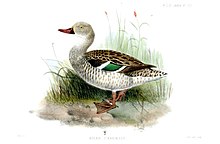Cape Teal
| Cape Teal | |
|---|---|
 | |
| Conservation status | |
| Scientific classification | |
| Kingdom: | Animalia |
| Phylum: | Chordata |
| Class: | Aves |
| Order: | Anseriformes |
| Family: | Anatidae |
| Subfamily: | Anatinae |
| Genus: | Anas |
| Species: | A. capensis |
| Binomial name | |
| Anas capensis (Gmelin, 1789) | |
The Cape Teal (Anas capensis) is a 44-46 cm long dabbling duck of open wetlands in sub-Saharan Africa.
This species is essentially non-migratory, although it moves opportunistically with the rains. Like many southern ducks, the sexes are similar. It is very pale and mainly grey, with a browner back and pink on the bill (young birds lack the pink). The Cape Teal cannot be confused with any other duck in its range.
It is a thinly distributed but widespread duck, rarely seen in large groups except the moulting flocks, which may number up to 2 000.
This species feeds on aquatic plants and small creatures (invertebrates, crustaceans and amphibians)obtained by dabbling. The nest is on the ground under vegetation and near water.
This is a generally quiet species, except during mating displays. The breeding male has a clear whistle, whereas the female has a feeble "quack".
The Cape Teal is one of the species to which the Agreement on the Conservation of African-Eurasian Migratory Waterbirds (AEWA) applies.


No comments:
Post a Comment